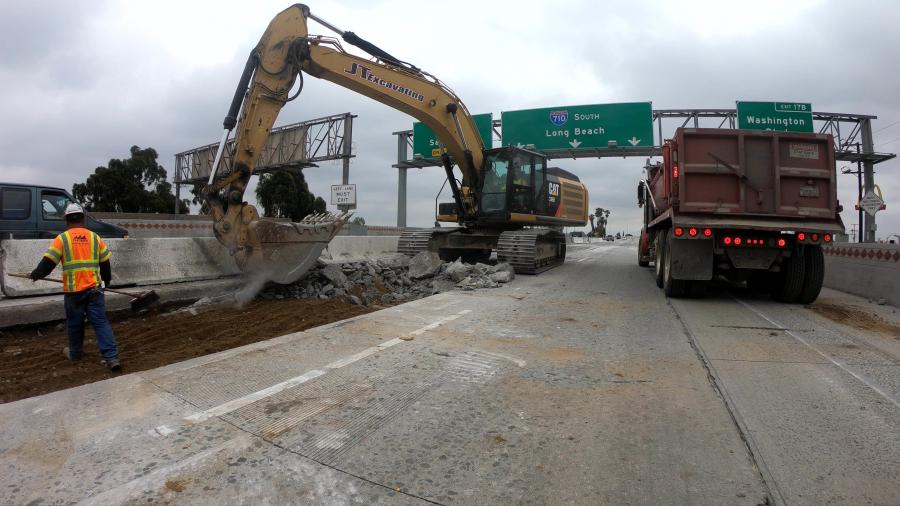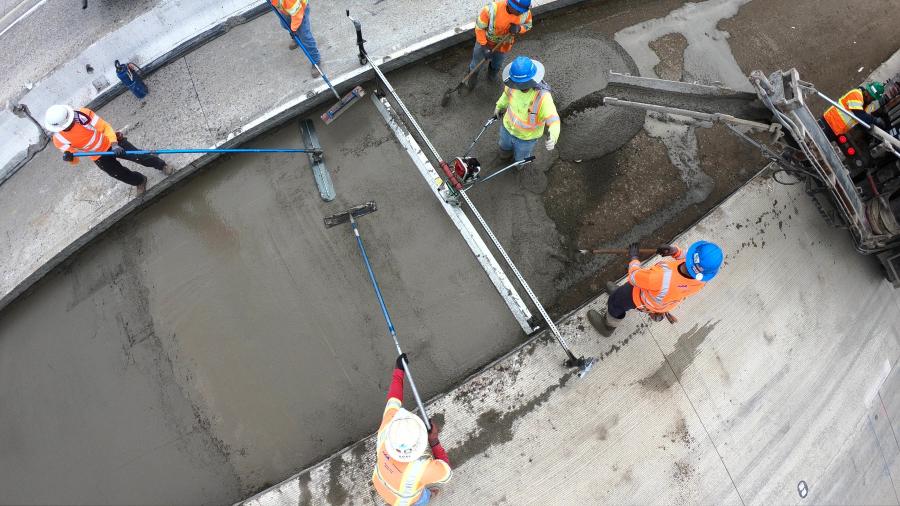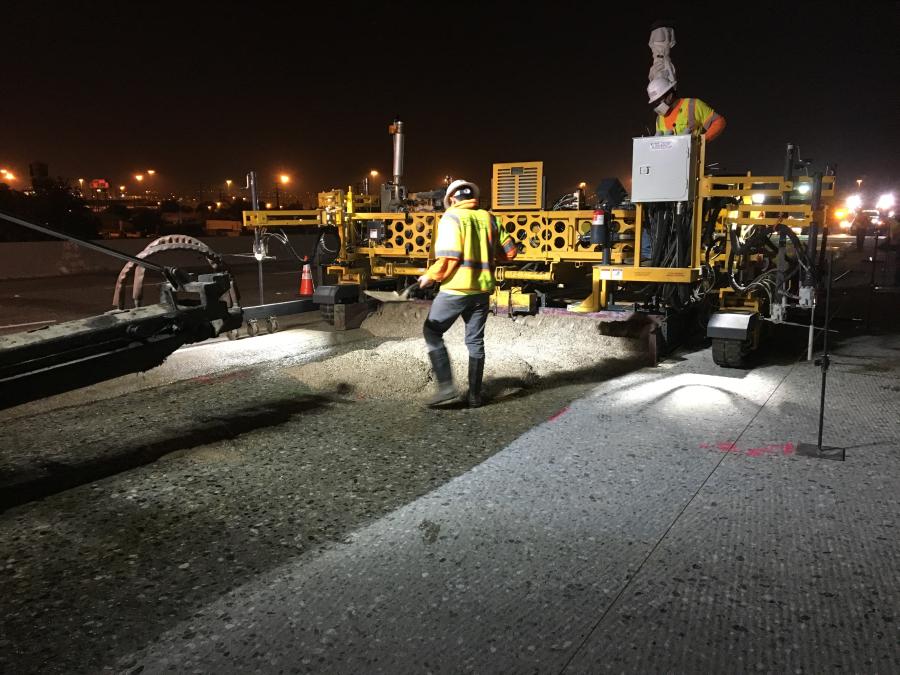For its efforts on the Interstate 710 Pavement Rehabilitation and Bridge Widening Project, Flatiron and Caltrans earned Project of the Year and Freeway/Expressway Project of the Year.
Throughout the duration of the $150.7 million Interstate 710 Pavement Rehabilitation and Bridge Widening Project, construction crews from Flatiron worked relentlessly in an attempt deliver the massive job ahead of schedule.
Flatiron did just that, completing construction 1.5 years ahead of schedule and on budget.
The combined efforts of Flatiron and Caltrans, who oversaw the project, earned two prestigious awards — the Project of the Year with the International Partnering Institute and the California Transportation Foundation's Freeway/Expressway Project of the Year, which was handed out earlier this year.
The project on I-710 covers a 3.5-mi. stretch of the north-south I-710 through the cities of Commerce, Vernon, Bell and the unincorporated area of east Los Angeles from Slauson Avenue to State Route 60.
Mike Roe, Flatiron's project manager, stressed that getting ahead of schedule was a goal from the start of construction in May 2018.
"This went back to the early stages, with the bridge widening, especially the biggest – the Hobart Yard Bridge," he said. "The original schedule was to do all the bridge widenings, completing that phase before moving onto the freeway concrete pavement replacement work. We analyzed the schedule and sequenced the work to complete all outside paving work consecutively with the bridge widening work and timed it to be able to start inside lane paving as soon as the bridges were complete. That shaved about six months off the schedule by overlapping the stages.
"For the Washington Bridge widening, we did an outside widening in the early stage and due to traffic restrictions there was a space in the middle where had to come back later on to complete the widening," he added. "We looked at the traffic pattern and striping plan and we were able to shift traffic around enough to where that work could be done at the same time as the final median stage. We were able to do them consecutively, which shaved off another five months. We had another stage to pave lane 1 and 2 that we were supposed to do at the end of the project, that would take three months. We were able to re-sequence that element and make it part of the median stage. That added up to about 18 months and led to the early completion"
The project required the general contractor to utilize a number of pieces of Cat iron, including backhoes: Cat 430Es and a Cat 430E; excavators: a Cat 308E2 CRSBs, M322Ds, 321Cs 328D, 330CLs, and 345Cs; rollers: a Cat CS563; loaders: Cat 938G IIs, 950Hs, 950Gs, 950 HQs, and 950Ks; and a skid steer —a Cat 259D CCE.
Demolition and excavation operations generated large amounts of concrete, asphalt and steel.
"We were able to recycle a majority of the demolition concrete and asphalt on-site," said Roe.
New materials included 90,000 tons of concrete and asphalt.
Smooth Operation
There were few design and engineering changes.
"Most of everything was done according to the plan," said Kevin Bui, the assistant resident engineer for the project. "We had anticipated possible issues with the subgrade at certain locations within the job limits. Flatiron went out ahead of time and drilled at several locations to see what the conditions of the subgrade were. There were a few areas where it was not optimal and we were prepared for that. When we encountered those areas we had a game plan in place to help Flatiron excavate them out and recompact them to minimize the delays in production."
Roe noted that the subgrade issues fell within the unforeseeable conditions category.
"The effort was coordinated between the two of us and it saved a lot of time and resolved problems on those early weekends," he said.
To ensure that the weekend work was maximized, Flatiron planning staff put together a layout of the benchmarks and the limits.
"We overlaid those plans with Google Earth and we provided information on a printout to every foreman and inspector from Flatiron and Caltrans," said Roe. "Everybody had the exact limits of the work that would be done and every crew knew their specific tasks."
Bui stressed that the geographic information system (GIS) tool used to coordinate the pavement replacement, using Google Earth maps, was helpful in identifying access areas.
‘When you are working with lane closures, you have limited access to get equipment in and out of the site," said Bui, "and if you don't have enough access, it can get jammed up pretty quickly, which impacts production. This is a good tool to use on other projects."
The bridge work was completed in February 2020 with the demolition of the existing overhangs and final closure pours on the Hobart Bridge.
"The lane replacement work was done around June of 2020 and from there we finished up the job doing the median replacement that was finished at the end of the year," said Roe. "Some of the roadway work went on a little longer.
Both Caltrans and Flatiron are proud of the awards recognizing their efforts.
"We're all very happy and proud," said Bui.
"We're pleased to be able to show an example of how we can partner together and how partnering can create these successful outcomes," said Eric Menjivar, public information officer of District 7. "We weren't afraid to take some risks and combine stages, nor were we afraid to hear each other out. We were open to each other's suggestions. We're proud of what worked and hopefully it sets an example for other projects."
In southern California, Flatiron purchases and rents equipment from Ahern; Ecco; JT Excavating; Myles; Quinn; Savala; Sunbelt; Sunstate; Terry Equipment and United Rentals.
"Coordinating equipment needs for each weekend was an extensive effort and we relied heavily on these companies to provide the necessary equipment." said Roe. CEG
Irwin Rapoport
A journalist who started his career at a weekly community newspaper, Irwin Rapoport has written about construction and architecture for more than 15 years, as well as a variety of other subjects, such as recycling, environmental issues, business supply chains, property development, pulp and paper, agriculture, solar power and energy, and education. Getting the story right and illustrating the hard work and professionalism that goes into completing road, bridge, and building projects is important to him. A key element of his construction articles is to provide readers with an opportunity to see how general contractors and departments of transportation complete their projects and address challenges so that lessons learned can be shared with a wider audience.
Rapoport has a BA in History and a Minor in Political Science from Concordia University. His hobbies include hiking, birding, cycling, reading, going to concerts and plays, hanging out with friends and family, and architecture. He is keen to one day write an MA thesis on military and economic planning by the Great Powers prior to the start of the First World War.
Read more from Irwin Rapoport here.
Today's top stories



















